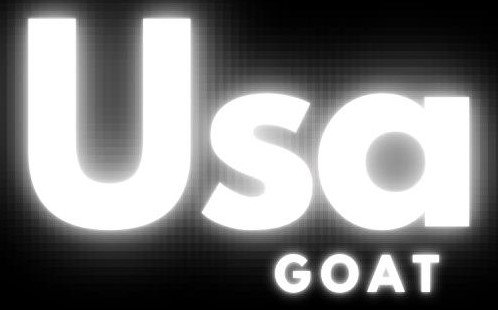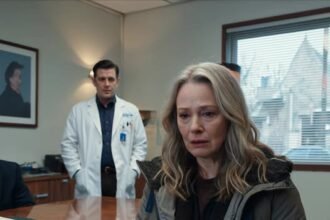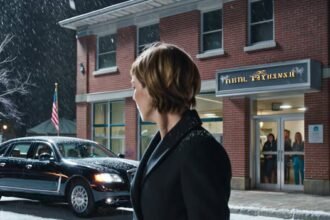He had simply not done it with the speed and deference the young airman expected. “See, he’s getting it,” Airman Chen said, a note of relief in his voice, as Patrick slowly, deliberately reached into the back pocket of his worn trousers. His movements were careful, methodical, the economy of motion learned by a body that understood its limits.
Davis ignored his partner. He stepped forward, crowding Patrick, his shadow falling over the old man. “Took you long enough.
Let’s see it.”
Patrick produced a simple leather wallet and pulled out a state-issued driver’s license. The photo showed a man with the same pale eyes, but with fewer lines mapping the terrain of his face. He handed it over.
Davis glanced at it and scoffed. The sound was sharp, derogatory. “Patrick Donovan.
Great. This gets you into a bar, not onto a secure military base. I need a DoD-issued identification card.
A dependent ID. A retiree ID. Something.”
Patrick met his gaze.
The calm in his eyes didn’t waver. “That’s the only one I carry.”
This was the opening Davis wanted. He puffed out his chest.
“Then how did you get on my base?” His voice was rising, accusatory, playing to the small, growing crowd. A civilian contractor pushing a tool cart stopped a dozen yards away. The airmen heading to lunch had now pulled out their phones, masked amusement on their faces.
“The main gate sentry was very helpful,” Patrick said, his voice even, unbothered. “He recognized my vehicle’s bumper sticker and waved me through. He said the commander had issued a standing invitation.”
This was, to Davis, an unbelievable lie.
A bumper sticker? A standing invitation? For this random old man?
The sheer absurdity of it fueled his aggression. “A bumper sticker. Right.
And I’m the Chief of Staff of the Air Force.” Davis’s face was turning red. “You’re lying to a federal officer, old man. That’s a serious offense.”
He pushed the driver’s license back at Patrick’s chest.
“You’re coming with us.”
He reached out to take Patrick’s arm. It was a practiced, firm grip, the kind they taught in training to control a subject. The “pain compliance” hold.
The moment his fingers closed around the thin fabric of Patrick’s jacket, something shifted in the old man’s demeanor. It was almost imperceptible. The placid calmness in his eyes didn’t disappear, but it was joined by something ancient and hard, a glint of polished steel.
The air temperature around them seemed to drop ten degrees. “Son.”
Patrick’s voice was low, but it cut through the afternoon air with newfound weight. It wasn’t the voice of a frail old man.
It was the voice of a man who had given orders in the screaming chaos of a cockpit, a voice that had been obeyed over the roar of flak and engines. “I’d advise you to take your hand off me.”
The quiet, absolute authority in that statement gave Davis a moment’s pause. His hand froze.
Chen took the opportunity to intervene, his voice nervous. “Davis, hold on. Let’s just… let’s just call this in.
We can have someone from visitor control come down.”
“Negative,” Davis snapped, his authority challenged not just by the old man, but by his own partner. The humiliation of being questioned in front of the crowd made him double down. His grip on Patrick’s arm tightened, his fingers digging in.
“This is a security issue. He’s an unknown. He’s lying, and he’s refusing to cooperate.
Standard procedure.” He looked past Patrick at the onlookers, puffing his chest out. This was his show. He was the one maintaining order.
Then, his eyes fell on a small, worn leather pouch attached to Patrick’s belt. It was old. The leather was cracked.
The stitching was frayed. “And what’s in there?” Davis demanded, pointing at it with his free hand. “You’re not allowed to carry unauthorized items on base.
Let me see it.”
He didn’t wait for an answer. He let go of Patrick’s arm and his hand lunged for the pouch. The instant his fingers brushed against the aged leather, the world tilted.
Part 2
Not for Davis. For Patrick. The roar of a nearby F-16 taking off blended and transformed, deepening into the thunder of two J79 turbo-jet engines at full afterburner.
The smell of hot Texas asphalt was gone, replaced by the acrid, metallic scent of cordite, ozone, and hot electronics in a cramped, vibrating cockpit. For a split second, a vivid image flashed behind his eyes. A younger man’s hand, covered in a stained flight glove, clutching an identical leather pouch.
The knuckles were white. The cockpit was shaking violently, a deafening shriek filling his helmet as a red warning light pulsed on the dash. Outside the canopy, the sky was stitched with red tracer rounds.
“Taking heavy fire, Pat! I’m hit! I’m hit!”
A voice screamed over the radio.
Jimmy’s voice. “Punch out, Rocket! Punch out!” Patrick had yelled back, yanking his own stick into a hard break, trying to draw their fire.
“It’s too late, Ghost. I’m… I’m burning. Tell…”
The radio went to static.
A bright orange flower bloomed against the green jungle canopy far below. The vision was gone as quickly as it came, leaving an icy rage in its wake. Patrick’s free hand, the one holding his cane, moved with a speed that defied his 86 years.
It wasn’t the movement of an old man. It was the precise, economical motion of a predator. His hand clamped down over Davis’s wrist, the one reaching for the pouch.
His grip was not the feeble grasp of the elderly. It was a vise. The knuckles and sinews of his hand were like knotted rope, forged by a lifetime of gripping a flight stick under 9 Gs.
Davis cried out, a sharp yelp of surprise and pain. Patrick’s voice was no longer quiet. It was a low growl, a sound of absolute, lethal command that seemed to come from another man, another lifetime.
“Don’t. Touch. That.”
The change was so sudden, so complete, that it stunned Davis into immobility.
The onlookers murmured, their amusement turning to shock. The phones were held higher. Airman Chen took a step back, his eyes wide.
The illusion of a frail, confused old man had been shattered. In his place stood someone else, someone whose presence filled the space with an unspoken and formidable power. Davis, caught in the grip of a man he had dismissed as feeble, could only stare, his own bravado faltering for the first time.
He tried to pull his wrist free, but the old man’s grip was immovable. “You’re… you’re assaulting an officer!” Davis sputtered, his voice cracking, a desperate attempt to regain control. “Chen, get him!
Help me!”
Chen just stood there, paralyzed. “Let go of me, old man, or I’ll…”
“You’ll what, Airman?” Patrick’s voice was still a low growl, his pale blue eyes now burning with a cold fire. “You’ll lecture me?
You’ll cuff me? You have no idea what you’re doing. You have no idea what you’ve put your hands on.”
“I’m putting you under arrest!” Davis shrieked, finally wrenching his hand free, not through strength, but because Patrick let him go.
The release was sudden, and Davis stumbled back, his face crimson with humiliation and rage. He had been manhandled. He had been embarrassed.
This was the point of no return. “That’s it!” Davis roared. He unclipped his handcuffs from his belt.
“You’re being detained for assaulting a federal officer and resisting arrest! Turn around! Put your hands behind your back!”
Patrick didn’t move.
He simply stood there, his gaze one of profound, crushing disappointment. “Son, you are making a catastrophic mistake.”
“I’m not your ‘son’!” Davis spat. “Turn!
Around! Now!”
He lunged forward, grabbing Patrick’s arm again, this time with violent intent, twisting it behind his back. The old man’s body was thin, but it was rigid with discipline.
A sharp crackle of static from his radio interrupted him. “Sentry 2, what’s your status? We’re getting a call about a disturbance.”
Davis, one hand holding the cuff, the other trying to wrestle Patrick’s arm, fumbled for his radio.
“Dispatch, I have the subject… I’m detaining the subject! He’s resisting!”
“Who is the subject?” the radio crackled back. “He’s a… an old man… Patrick Donovan!”
A different kind of static seemed to fill the air.
A silence that lasted one second, two, then three. “Sentry 2,” the radio voice came back, but it was different now. Colder.
Tighter. “Hold your position. Do not transport.
A supervisor is en route.”
But Davis wasn’t listening to the radio. He was lost in his own red mist of fury. He had an audience.
He had been defied. He was going to win. “Too late,” he muttered, and with a final, violent yank, he managed to get the first steel cuff snapped around Patrick’s thin, wrinkled wrist.
The sound. The click of the ratchet. It echoed in the silence.
It was a sound of finality. A line crossed. The crowd gasped.
The airmen with their phones weren’t laughing anymore. They were just filming, their faces blank with a kind of communal horror. They had all just become witnesses to something awful.
Ten minutes earlier, and a half-mile away, Master Sergeant Eva Rostova was on her way to the First Sergeant Symposium, her mind preoccupied with budgets and personnel files. She was a career NCO with 22 years of service. She had seen it all.
She had seen brash young lieutenants humbled, and quiet airmen rise to greatness. She knew the rhythm of the base better than she knew her own heartbeat. The scene unfolding by the F-4 display had pulled her in.
She didn’t join the crowd. She stood back, near a large oak tree, observing. She watched Airman Davis, and her eyes narrowed.
She saw his unprofessionalism, his need to dominate the situation rather than resolve it. She called it “puffed-chest syndrome.” A dangerous condition for someone with a badge and a weapon. But it was the old man who held her attention.
She saw his posture, the way he stood, even while leaning on a cane. There was an ingrained straightness to his spine. She saw the look in his eyes when Davis grabbed his arm.
Not fear, not anger, but that flicker of profound disappointment, as if he were a king watching a court jester make a fool of himself. And when he spoke, when that low, commanding growl emerged… “Don’t. Touch.
That.”
Rostova felt a chill run down her spine. That was not the voice of a confused civilian. That was a command voice.
That was a voice that had been forged in crisis. That was the voice of a leader. While Davis sputtered and reached for his handcuffs, Rostova knew, instinctively, that this was about to go terribly wrong.
An octogenarian civilian, posing no threat, was about to be cuffed in the middle of the base for the crime of being slow and uncooperative with an arrogant airman. This was a mistake that could ripple far beyond a simple security incident. Without a second thought, she turned, melting back into the shadow of the oak tree.
She pulled out her cell phone, bypassing the Security Forces dispatch entirely. Going through the normal channels would be too slow, too bureaucratic. This required a higher intervention.
She scrolled through her contacts and found the number for the Wing Command Chief’s executive assistant, a Senior Master Sergeant she knew from a joint committee. The phone was answered on the second ring. “Sergeant Miller, this is Master Sergeant Rostova.
I’m over at Heritage Park.” She kept her voice low but urgent. “We have a situation. A couple of your SF kids are detaining an elderly civilian.”
She could hear Miller’s sigh on the other end.
“Another one. Just have them escort him to the visitor’s center, Eva. The Commander’s in a briefing.”
“Sir, with respect, I don’t think the visitor’s center is the right answer,” Rostova pressed, her eyes darting back to the scene.
Her heart lurched. “God damn it. He’s cuffing him.
Davis has the man in cuffs. Right now.”
“What?” Miller’s voice lost its routine tone. “They’re making a scene.
The airman, Davis, is way over the line. But that’s not the main issue. The man… they’re treating him like a criminal.
He’s not resisting, he’s just… old.”
“What’s his name?” Miller asked, his tone now clipped, professional. “He gave them a driver’s license. The name is Patrick Donovan.” Rostova paused, then added the crucial piece.
The piece that had been nagging at her. “Sir… I know it’s a long shot. And maybe I’m crazy.
But that name… it’s the same name on the dedication plaque. For the F-4. The one they’re standing right next to.
The one they call the ‘Phantom’s Ghost’.”
The silence on the other end of the line was immediate and absolute. It was a silence so profound, Rostova thought the call had dropped. For five long, agonizing seconds, she heard nothing.
Then, Sergeant Miller’s voice came back, and all traces of professionalism were gone. It was replaced by pure, unadulterated alarm. “Rostova… are you sure?“
“It’s the name on the ID, sir.
It’s the name on the plaque. I’m looking at both.”
“Oh… oh, God,” Miller whispered. “Stay there.
Do not let them take him anywhere. I’ll handle it.”
The line went dead. Rostova knew the message had been received.
The cavalry, in some form or another, was on its way. She just hoped it would arrive before Airman Davis did something he could never, ever take back. Inside the Wing Headquarters building, a sprawling brick structure known as “The White House,” Colonel David Matthews was in the middle of a tense video conference with the Pentagon.
He was gesturing at a slide deck, explaining logistical shortfalls. His command chief’s executive, Senior Master Sergeant Miller, burst into the room without knocking. It was a catastrophic breach of protocol.
Miller, who was known for his unflappable demeanor, looked like he had just seen a ghost. His face was pale, his uniform jacket rumpled. “Sir, you need to see this,” Miller said, his voice trembling.
Matthews shot him a look of pure fury. “Miller, what in God’s name do you think you’re—”
“Sir!” Miller cut him off, another massive breach. He didn’t speak further.
He simply placed his phone on the polished mahogany table. It was open to a web page. The base’s own historical archives.
At the top was a grainy, black-and-white photo of a young pilot in a flight suit, leaning against the nose of an F-4 Phantom, a cocky grin on his face. The headline read: “The Phantom’s Ghost: The Legend of Colonel Patrick Donovan.”
Matthews’s eyes flicked from the photo to the name, then back to Miller’s terrified face. “What is this?” he demanded, his voice a low growl.
“Security Forces,” Miller said, his voice barely a whisper. “They’re detaining him. At his own monument.
Sir… they just cuffed him.”
The blood drained from Colonel Matthews’s face. The color of his skin went from a healthy tan to a sickly, ashen gray. He stared at the phone as if it were a venomous snake.
The Pentagon briefing. The logistical shortfalls. The four-star general on the screen.
Everything evaporated. There was only this. This colossal, unimaginable, career-ending disaster.
He slammed his hand down on the desk, cutting off the general mid-sentence. “This meeting is over!” he barked at the monitor before snapping the laptop shut. He stood up, his chair scraping violently against the floor.
“Get me the Security Forces Commander on the phone. Now!” he roared at Miller. He turned to his aide, a young captain.
“Get my staff car to the front entrance. Tell them to run hot. Now!“
The aide just stared blankly, confused by the sudden chaos.
“What are you waiting for, Captain?! GO!” Matthews bellowed. “They’ve got Patrick Donovan at the F-4 display!”
The aide still looked confused.
“Sir… who?”
Matthews grabbed the aide by the shoulders. “Yes, the Patrick Donovan!” his voice echoed in the suddenly silent office. “The Ghost!
Dear God, what are they doing to him?”
The name, spoken with such reverence and panic, finally registered. The captain’s eyes widened in dawning horror. A legend was not just visiting their base.
He was in their custody. Back at Heritage Park, Airman Davis was riding a wave of adrenaline and misplaced authority. He had successfully secured one of Patrick’s wrists in a steel cuff.
The old man hadn’t fought back, but the act of cuffing him felt like a victory. The crowd was silent now, their phones held up, recording his triumph. He was in control.
“See?” he said, his voice loud for the benefit of his audience. “This is what happens when you don’t follow the rules, old-timer. When you don’t show respect for the uniform.”
Patrick simply watched him, his expression one of immense, profound sadness.
He did not look like a man being arrested. He looked like a teacher watching his most disappointing student fail a simple test. “We’re going to take a nice long ride down to the station,” Davis continued, his chest puffed out as he reached for Patrick’s other arm.
“Get you processed. We’ll have to run a full background check, of course. Figure out who you really are.”
He leaned in closer, his voice dropping to a conspiratorial and condescending whisper, a final twist of the knife.
“Maybe we’ll even get you a psych evaluation. See if you’re fit to be wandering around on your own. It’s for your own good.”
It was the final, unforgivable insult.
It wasn’t just about a mistaken identity anymore. It was a threat to strip Patrick of his dignity, his sanity, his very autonomy. Davis had crossed a line from which there was no return.
He had sealed his own fate with that one arrogant, venomous threat. And that’s when the first sound cut through the air. It was a distant siren, a sharp, piercing wail that was different from the usual base alerts.
It was a “command” siren. Then came the screech of tires on pavement. It wasn’t a standard patrol car that whipped around the corner.
It was a black command staff car, a Chevrolet Suburban with polished chrome and official flags mounted on the front fenders. It slid to a halt just feet from the scene, its tires kicking up gravel. Immediately behind it, two Security Forces trucks, lights flashing, boxed in the area.
The doors of the staff car flew open before it had fully stopped. Colonel David Matthews erupted from the passenger side, his face a mask of controlled fury. His service cap was perfectly aligned, his uniform immaculate, but his eyes were blazing.
Following him was the Wing Command Chief, the highest-ranking enlisted member on the base, his expression just as grim. From the other trucks, the Security Forces Commander—a full Lieutenant Colonel—and several senior NCOs disembarked, moving with a speed and purpose that electrified the atmosphere. The casual, curious crowd snapped into motion.
Airmen who had been slouching and watching on their phones suddenly straightened their backs, their hands fumbling to hide their devices. Their faces were a mixture of fear and confusion. The air crackled with a new, terrifying level of authority.
The temperature of the entire encounter had changed in a heartbeat. Airman Davis froze. His hand was still on Patrick’s uncuffed arm, his mouth slightly agape.
His little show had just been gate-crashed by the most powerful men on the base. Colonel Matthews didn’t spare a glance for Davis or Chen. His focus was entirely on the old man in the single handcuff.
He strode forward, his polished black shoes crunching on the gravel path, covering the distance in three long, purposeful strides. He stopped directly in front of Patrick Donovan. He didn’t speak.
He didn’t demand an explanation. He didn’t ask Davis what happened. He simply brought his right hand up to the brim of his cap in the sharpest, most profound salute of his career.
His arm was ramrod straight, his posture a study in absolute respect. One by one, the Command Chief, the Lieutenant Colonel, and every other uniformed person who had arrived with him did the same. The sound of a dozen hands slapping against caps and brows echoed in the now-deafening silence.
They stood there, a line of the base’s most senior leadership, saluting a cuffed civilian. Airman Davis stared, his mind unable to process what he was seeing. His arm was still frozen in mid-air.
Airman Chen looked like he was about to be physically ill. The crowd was utterly, terrifyingly still. Finally, still holding the salute, Colonel Matthews spoke.
His voice was loud, clear, and projected for every single person to hear. “Mr. Donovan, I am Colonel Matthews, the Wing Commander.
On behalf of every Airman on this base, I offer my deepest, most profound apology. We are honored to have you here, sir.”
He then slowly lowered his hand and turned, his eyes locking onto Davis. The fury he had been holding back was now unleashed, cold and precise.
“Airman,” he said, his voice dropping to an icy, dangerous level. “Do you have any idea who this is?”
Davis was speechless. He could only shake his head, his face ashen, his body trembling.
“This,” the Colonel said, his voice rising with each word, “is Colonel Patrick Donovan. United States Air Force. Retired.”
He jabbed a finger toward the F-4 on its pedestal.
“This is the man they call the ‘Phantom’s Ghost.’ He flew over 150 combat missions in that very aircraft. That is his name on the plaque you’re standing next to!”
He took another step, closing the distance to Davis, who flinched. “He was shot down twice behind enemy lines and evaded capture twice.
He is the recipient of the Air Force Cross, two Silver Stars, the Distinguished Flying Cross, and five Purple Hearts.”
A collective, audible gasp went through the crowd. Phones that had been recording a minor incident were now capturing a moment of living history. The snickers and murmurs of mockery had been replaced by a wave of awe and profound, secondhand shame.
Everyone was looking at Patrick Donovan, truly seeing him for the first time. Not as an old man, but as a titan. “This man,” Colonel Matthews concluded, his voice shaking with a rage so profound it was almost quiet, “is a living legend.
He has sacrificed more for his country than you can possibly imagine. And you… you put him in handcuffs.“
Colonel Matthews turned his full attention back to the petrified airman. “Davis.
You are a disgrace to that uniform,” he said, his voice a low, venomous hiss. “You have forgotten the very first principle of our service: Honor. You have forgotten the last line of the Airman’s Creed: I will never falter, and I will not fail.“
“Today,” Matthews whispered, “you have failed.
You have failed this man. You have failed this base. And you have failed the United States Air LForce.”
He turned to the Security Forces Commander.
“Lieutenant Colonel, I want this airman’s patrol duties suspended. Indefinitely. He will report to my office at 0800 tomorrow with his supervisor and his First Sergeant.
We will be having a very long conversation about his future.”
He then gestured sharply to the Command Chief. “Chief. Get those cuffs off him.
Now.”
The Chief hurried forward with a key, fumbling for a moment before unlocking the single cuff from Patrick’s wrist. As the steel fell away, Patrick rubbed his skin, not out of pain, but as if wiping away the insult. He then looked up, not at the Colonel who had defended him, but at the young, terrified, and broken Airman Davis, who seemed to be shrinking inside his own uniform.
Patrick Donovan finally spoke. His voice was quiet, but it carried across the silent plaza with the weight of decades. “Son,” he said.
His tone was devoid of anger, filled only with a deep, weary wisdom. “Fear and pride are a dangerous cocktail. They make you see threats where there are only people.
They make you deaf to everything but the sound of your own importance.”
He paused, letting the words sink in. “That uniform,” he continued, gesturing with his chin toward Davis’s crisp blue shirt, “it isn’t armor to make you strong. It’s a promise.
A promise that you serve something bigger than your own ego. A promise to the people who came before you, and the ones who will come after.”
“Remember that.”
The lesson, delivered with such grace in the face of such profound disrespect, was more damning than any official punishment could ever be. It was a quiet, gentle rebuke that landed with the force of a physical blow.
Patrick’s gaze then fell to the small, worn leather pouch on his belt. The one that had been the flashpoint. He gently laid his hand over it, his thumb tracing the frayed stitching.
The Texas sun vanished. He was back in a dim canvas tent, smelling the dust of a forward operating base. A younger Patrick, his face tense with pre-flight jitters, was looking at his wingman, a cocky, red-headed captain named Jimmy “Rocket” Riley.
Jimmy was holding out the very same pouch. “For luck, Pat,” he’d said with that stupid grin. “It was my dad’s.
Carried it all through Korea. You just make sure you bring it back, you hear?”
They had shared a smile, a brief moment of connection before climbing into their cockpits. The image faded, leaving behind the ghost of a promise.
The pouch wasn’t a good luck charm. It was a memorial. Jimmy’s plane had never come back from that mission.
In the present, Patrick looked up, his eyes seeming to see a distant horizon. He had brought the pouch back, just as he had promised. And he had carried it ever since.
The fallout from the incident at Heritage Park was swift and decisive. Airman Davis was, as promised, removed from all patrol duties. He was reassigned to the base’s records management office, a quiet, windowless room in a basement, a purgatory where he spent his days filing paperwork.
The base command didn’t just punish him; they used his mistake as a teachable moment. A new mandatory training module was developed for the entire Security Forces group titled “Legacy and Respect.” It used the anonymized event as a case study in de-escalation, professional conduct, and, most importantly, the imperative to honor the veterans whose sacrifices built the very institution they were sworn to protect. Colonel Matthews issued a formal public letter of apology to Colonel Donovan on behalf of the entire wing, which was printed in the base newspaper.
Patrick, in a short, handwritten response, accepted it with his characteristic grace, asking only that the young airmen involved be “mentored, not discarded.”
Weeks turned into a month. One quiet Tuesday afternoon, the now-former Airman Davis, in civilian clothes, was in the base coffee shop, the “Java Jet,” waiting for his shift in the basement to end. He was staring into a cup of cooling coffee, the bitterness matching his own.
The door opened, and Colonel Patrick Donovan walked in, moving slowly with his cane. An aide, a young lieutenant assigned by Colonel Matthews to assist him during his extended visit, accompanied him. Patrick ordered a simple black coffee and sat at a small table by the window, looking out at the flight line.
Davis’s heart hammered in his chest. His first instinct was to slip out, to hide. He had been a ghost for a month, and he was sure the old man wouldn’t even recognize him out of uniform.
But the Colonel’s words—that gentle, devastating lesson—had been echoing in his mind for weeks. Remember that. He knew what he had to do.
His hands trembled. He felt sick. But he stood up.
He walked over to the table. The lieutenant eyed him, tensing, ready to intervene. Patrick looked up, his pale blue eyes calm and questioning.
“Sir,” Davis began, his voice cracking. “I… I’m the airman. From… from that day.
At the park.”
Patrick studied his face for a long moment, searching for something. “I just… I wanted to say I’m sorry. For everything.
There’s no excuse for how I acted. For what I said. For… for what I did.”
Patrick continued to look at him, his gaze unwavering.
It felt like an eternity. Davis’s eyes filled with tears. “I was… I was arrogant.
And I was wrong. I’m so sorry, sir.”
Patrick must have found what he was looking for. A hint of a smile touched the corners of his lips.
He gestured with his chin to the empty chair across from him. “Sit down, son,” he said, his voice raspy. Davis, stunned, sat down.
The lieutenant stepped back, giving them space. “Tell me,” Patrick said, taking a sip of his coffee. “Tell me what you’ve learned.”
And as the afternoon sun streamed through the window, the disgraced young airman and the living legend sat and talked.
Their conversation was a quiet bridge between generations, a testament to the power of a lesson learned, the burden of a legacy, and the grace of a second chance.





